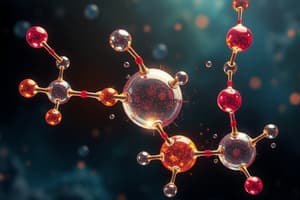Podcast
Questions and Answers
Why is ethanol less reactive than methanol towards nucleophilic addition reactions?
Why is ethanol less reactive than methanol towards nucleophilic addition reactions?
- Ethanol has a weaker nucleophile than methanol.
- Ethanol forms stronger hydrogen bonds compared to methanol.
- Ethanol has a larger molecular weight than methanol.
- Ethanol's oxygen has less electron density than methanol's. (correct)
What is the major product when chloroethane is treated with a saturated solution of AgCN?
What is the major product when chloroethane is treated with a saturated solution of AgCN?
- Ethyl isocyanide (correct)
- Acetic acid
- Methyl isocyanide
- Isocyanic acid
What is the impact of sodium ethoxide on 2-bromobutane in ethanol?
What is the impact of sodium ethoxide on 2-bromobutane in ethanol?
- It does not lead to alkene formation.
- It yields a mixture of butenes only.
- It exclusively produces 2-butene as the major product.
- It generates 1-butene as the major product. (correct)
What is the outcome when alkyl chloride or bromide is treated with Nal in acetone?
What is the outcome when alkyl chloride or bromide is treated with Nal in acetone?
What does partial double bond character in aryl halides suggest about their reactivity?
What does partial double bond character in aryl halides suggest about their reactivity?
What is the IUPAC name of the compound discussed?
What is the IUPAC name of the compound discussed?
What is the product of the addition of Br2 to but-1-ene?
What is the product of the addition of Br2 to but-1-ene?
Which species primarily attacks the benzene ring in electrophilic aromatic substitution reactions?
Which species primarily attacks the benzene ring in electrophilic aromatic substitution reactions?
Why does the SN2 reaction proceed with inversion of configuration?
Why does the SN2 reaction proceed with inversion of configuration?
What type of dihalide is ethylidene chloride classified as?
What type of dihalide is ethylidene chloride classified as?
What is the nature of the mixture produced when Br2 adds to trans-2-butene?
What is the nature of the mixture produced when Br2 adds to trans-2-butene?
Which reaction mechanism is preferred by a primary alkyl halide?
Which reaction mechanism is preferred by a primary alkyl halide?
Which alkyl halide undergoes SN1 reaction most readily?
Which alkyl halide undergoes SN1 reaction most readily?
What is the reason that benzyl bromide produces benzyl alcohol in acetone-water?
What is the reason that benzyl bromide produces benzyl alcohol in acetone-water?
What is the correct IUPAC name for the compound represented as 1-Bromo-2-methylbutane?
What is the correct IUPAC name for the compound represented as 1-Bromo-2-methylbutane?
Which statement is true regarding the nucleophilic substitution of vinyl chloride compared to ethyl chloride?
Which statement is true regarding the nucleophilic substitution of vinyl chloride compared to ethyl chloride?
What main product is formed when chloromethane is treated with excess ammonia?
What main product is formed when chloromethane is treated with excess ammonia?
What property does ethanol possess that methanol does not, in relation to the iodoform test?
What property does ethanol possess that methanol does not, in relation to the iodoform test?
Which of the following molecules is chiral?
Which of the following molecules is chiral?
What mechanism does the reaction of C6H5CH2Br with aqueous sodium hydroxide follow?
What mechanism does the reaction of C6H5CH2Br with aqueous sodium hydroxide follow?
Which alcohols can be arranged in the correct order of reactivity with halogen acids as (c) > (b) > (a)?
Which alcohols can be arranged in the correct order of reactivity with halogen acids as (c) > (b) > (a)?
Which reagent would best facilitate the conversion of CH3CH2CH2CH3 to CH3CH2CH2CH2Cl?
Which reagent would best facilitate the conversion of CH3CH2CH2CH3 to CH3CH2CH2CH2Cl?
In the reaction of toluene with a halogen in the presence of iron (III) chloride, what type of reaction occurs?
In the reaction of toluene with a halogen in the presence of iron (III) chloride, what type of reaction occurs?
Which of the following is considered a vic-dihalide?
Which of the following is considered a vic-dihalide?
Which option reflects the increasing order of boiling points for the given compounds?
Which option reflects the increasing order of boiling points for the given compounds?
What classification best describes the position of -Br in the compound CH3CH=CHC(Br)(CH3)2?
What classification best describes the position of -Br in the compound CH3CH=CHC(Br)(CH3)2?
Which of the following reactions produces chlorobenzene?
Which of the following reactions produces chlorobenzene?
Which of the following compounds has an asymmetric carbon atom identified with an asterisk (*)?
Which of the following compounds has an asymmetric carbon atom identified with an asterisk (*)?
Flashcards are hidden until you start studying
Study Notes
Alcohol Reactivity with Halogen Acids
- Alcohol reactivity order: (c) > (b) > (a).
- Specific alcohol CH3CH2-CH2-OH can yield alkyl chloride with concentrated HCl at room temperature.
Reactions of Toluene
- Toluene + halogen in presence of FeCl3 produces ortho and para halo compounds.
- This interaction is classified as an electrophilic substitution reaction.
Halogen Exchange Reaction
- Example of halogen exchange reaction: RX + Nal → Rl + NaX.
Alkyl Halide Reactions
- Reaction pathways:
- Primary alkyl halides prefer SN2 reaction.
- Tertiary alkyl iodide (CH3)3C-I undergoes SN1 reaction most readily due to stable carbocation formation.
IUPAC Nomenclature
- Correct IUPAC names:
- Compound identified as 1-Bromo-2-methylbutane (c).
- Compound identified as 3-Bromopentane (b).
Molecular Characteristics and Chirality
- Molecules with mirror images that are non-superimposable are termed chiral.
- 2-Bromobutane is identified as chiral.
- Recognition of asymmetric carbon atoms within certain molecules is key to understanding chirality.
Mechanisms and Assertions
- SN2 reactions involve an inversion of configuration and occur in a single step.
- Bromine addition to alkenes is classified as electrophilic addition.
- Vinyl chloride is less reactive in nucleophilic substitution compared to ethyl chloride due to structural influences.
- Ethanol yields iodoform test; methanol does not, based on reactivity differences.
- Nucleophilic substitution reactions feel the influence of ambident nucleophiles, such as cyanide ions.
Notable Observations
- The stability of carbocations influences the reaction pathways and outcomes in substitution reactions.
- Reaction conditions, such as the presence of light or special catalysts, affect the reactions of compounds like toluene and alkyl halides.
Assertion and Reason Relationship Insights
- Some interactions (like chloroethane with AgCN) lead to unexpected products based on nucleophilic properties.
- Assertions and reasoning should be critically evaluated, as some explanations may not directly correlate with the observations.
Use these notes to strengthen your understanding of organic chemistry reactions, mechanisms, reactivity trends, and the importance of structure in molecular behavior.
Studying That Suits You
Use AI to generate personalized quizzes and flashcards to suit your learning preferences.




